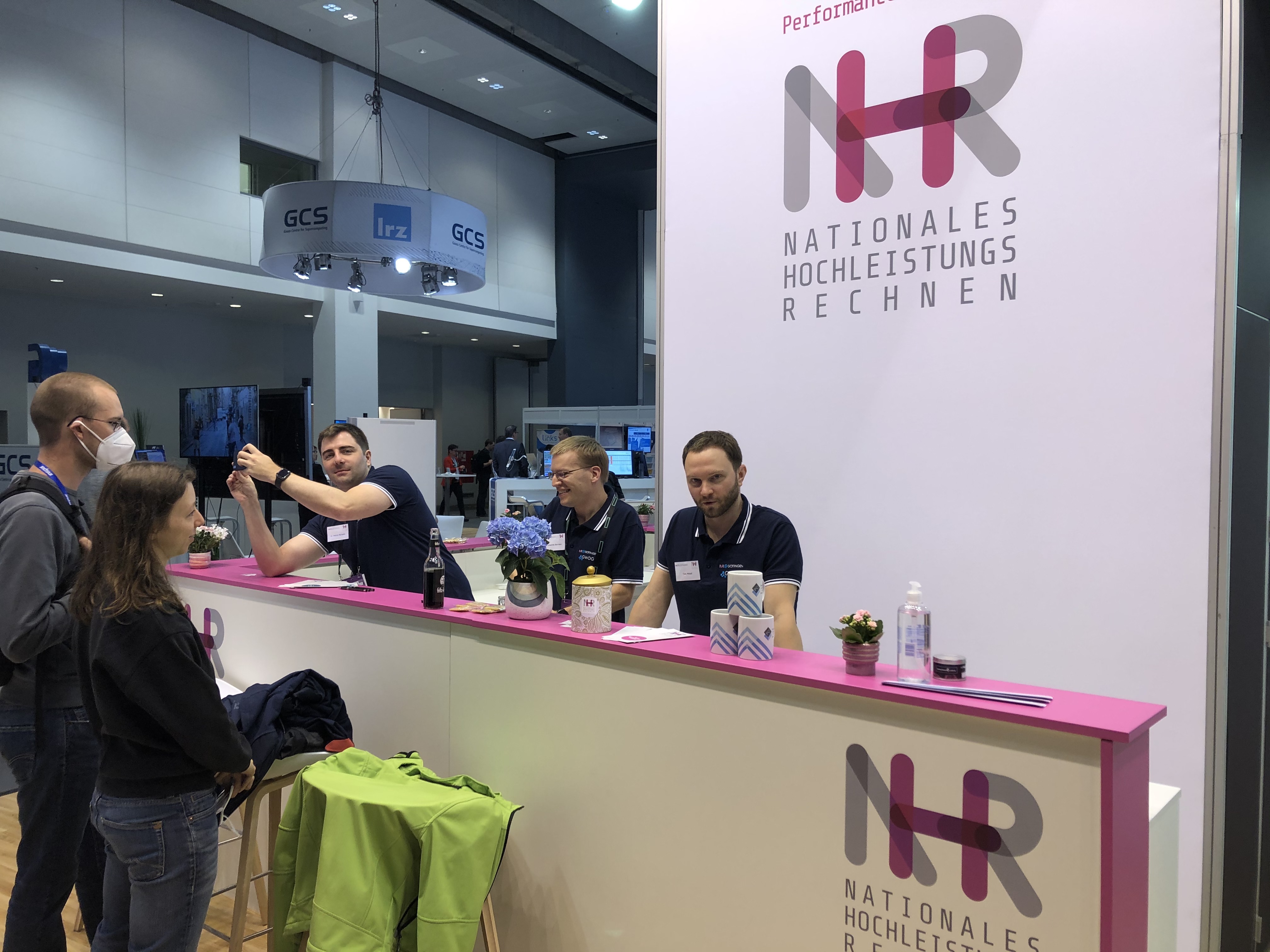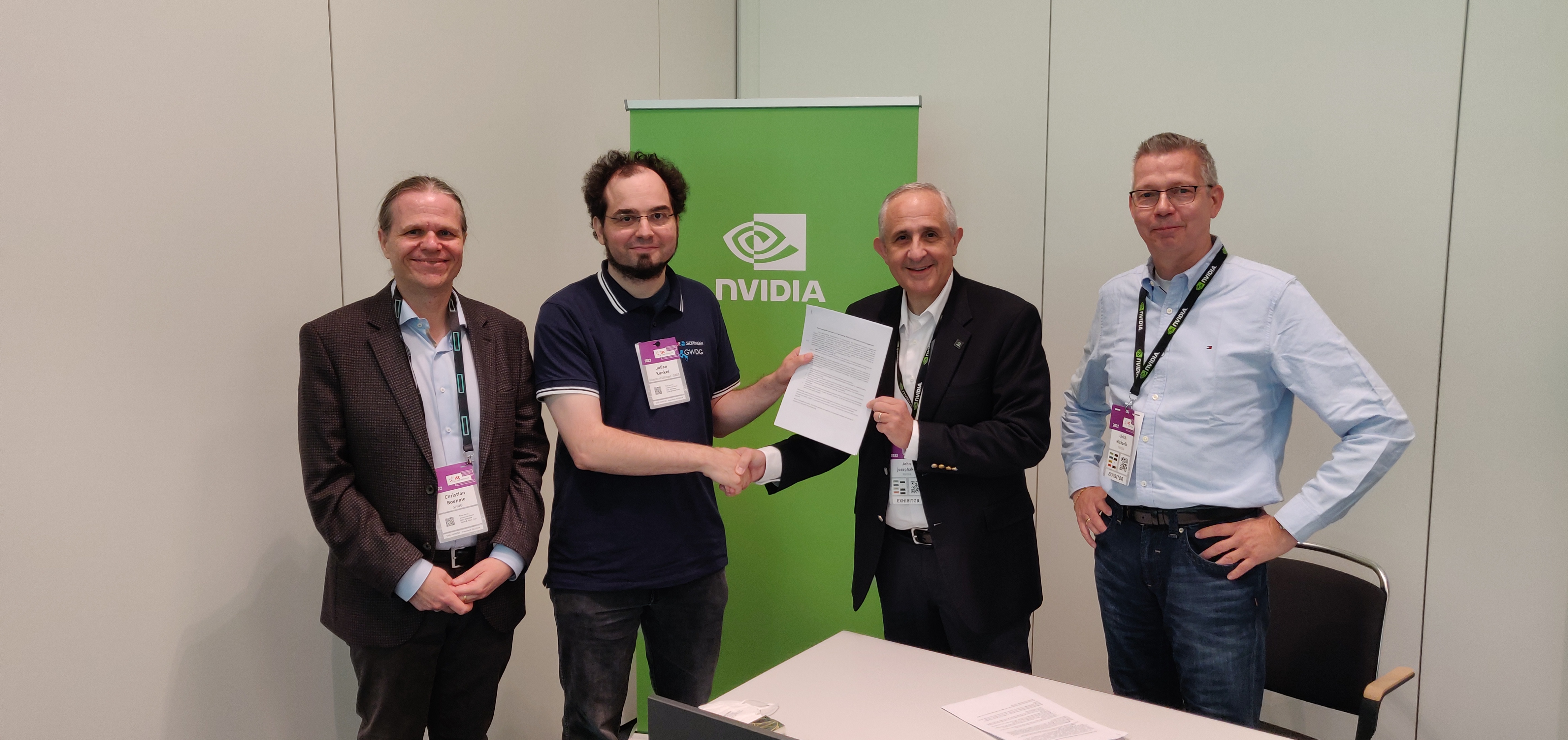The GWDG to be guest at ISC High Perfomance – The event for High Performance Computing, Machine Learning and Data Analytics.
After a two-year break, the supercomputing fair ISC High Performance took place this year from May 29 to June 2 in Hamburg. As Europe’s largest scientific conference and trade fair in the fields of High-Performance Computing, networks and storage technologies, it was the most important interface for international exchange for scientists in these fields. The ISC 2022 focused on the latest developments in high-performance computing, machine learning and data analysis. The GWDG was once again present and was also pleased to sign an agreement with NVIDIA for joint engagement in research and teaching.
Today’s economy can hardly do without the benefits of using high-performance computers. For example, new ways to produce are being explored, but financial analysis also requires increased demand for extensive computing power. High-performance computing (HPC) has become an essential tool and key technology in almost all scientific disciplines. Without the use of HPC systems, cutting-edge computational research in, for example, the life sciences, climate research, chemistry and engineering is no longer possible today. This was also demonstrated by ISC 2022, which was a hybrid event accessible both at the Congress Center Hamburg and online.
Activities-of-the-GWDG
The GWDG also took the opportunity to exchange experiences and to present itself and was represented at ISC 2022 (see Figure 1). As part of the joint booth of the Association for National High Performance Computing (NHR-Verein e. V.), the nine NHR centers presented their joint project. The centers themselves as well as cross-center activities were presented. In particular, the contribution of the association to the German HPC landscape and its importance for German research were presented. In order to fully represent the national HPC offering, the Gauss Alliance presented the activities of the state networks and the HPC centers as well as its IT services in direct proximity to the booth of the NHR Association under the focus “Platform for National HPC”. In addition to activities at the two booths of the NHR Association and the Gauss Alliance, presentations were given on project-specific topics in various formats. For example, Prof. Dr. Julian Kunkel, Deputy Head of GWDG – High-Performance Computing Division, explained the IO-500, which is currently becoming the de facto benchmarking standard for HPC storage, in the Birds-of-Feather session “The IO-500 and the Virtual Institute of I/O”. Also, in the “International HPC Certification” topic, Prof. Kunkel informed visitorsabout the creation of a common base for HPC trainersand userswhich is crucial for the further growth and development of the community. In another BoF session, Hendrik Nolte, a member of the GWDG Computing Working Group (AG C), spoke on the topic of “Large-Scale Data Management with Data Lakes”. In addition, in the workshop “HPC I/O in the Data Center,” organized by Prof. Kunkel, Sebastian Krey and Marcus Boden, both also members of AG C, brought together I/O expertsfrom data centers and application workflows to share current practices for scientific workflows, problems and obstacles in both hardware and software stacks, and research and development to overcome these issues.
In addition, the poster sessions were used to provide information about the various GWDG and AG C projects. Thereby, the staff membershad the opportunity to answer the questions of interested people at the topics “Provisioning an HPC infrastructure for the North German states” (Dr. Christian Köhler), “ForestCARE: Monitoring Forest Quality Using Satellite and Drone Data” (Dorothea Sommer) and “Container and Container Management NHR Project” (Azat Khuziyakhmetov). In addition to the lecture opportunities, the direct exchange with experts over a coffee or the meetings with manufacturers of hardware and software (also called vendor meetings) were in the foreground of the activities of the GWDG and have suitably rounded off the wide-ranging trade fair program as well as the visit to ISC 2022.

Fig. 1: (from left) Hauke Gronenberg, Dorothea Sommer, Patrick Michaelis, Johannes Biermann, Tino Meisel
GWDG and NVIDIA agree on joint commitment in research and teaching
The ISC High-Performance provides a good opportunity for exchange between companies and organizations. Also the GWDG used this to coordinate extensively with NVIDIA, a full-stack computing company with graphics processor and network infrastructure solutions for data centers. This not only provided an optimal overview of the current status quo of the long-standing cooperation, but also enabled the future cooperation to be further expanded. To this end, a Memorandum of Understanding (MoU) was signed between NVIDIA and the GWDG during the meeting (see Figure 2). Thus, the GWDG plans to work out workshops, boot camps and hackathons, among other things, in collaboration with NVIDIA in the future. Future optimization is also planned in areas such as HPC and AI applications as well as network technology, but also graphics processing in the life sciences. Not only NVIDIA and the GWDG will benefit from this cooperation, but primarily the users of the HPC systems of the GWDG and the NHR@Göttingen, who will have the opportunity to use the latest technologies and concepts for their research and teaching. The term Memorandum of Understanding (MoU) originates from the US legal system. It represents an official declaration of intent between two or more parties. With this MoU, companies and organizations can enter into official partnerships.

Fig. 2: After the MoU signing (f. l. t. r.): Dr. Christian Boehme (GWDG), Prof. Dr. Julian Kunkel (GWDG), John Josephakis, Global VP für Sales and Business Development für HPC/Supercomputing (NVIDIA), Ulrich Michaelis, Business Development Manager für HPC/Supercomputing & AI in Central Europe (NVIDIA)



